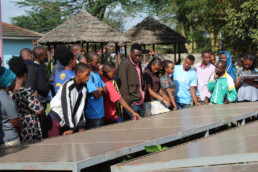Key contact:
Deutsche Gesellschaft für Internationale Zusammenarbeit (GIZ) GmbH Employment and Skills for Development in Africa (E4D)
Faustine Msangira
faustine.msangira@giz.de
Enabling youth empowerment in solar energy

Context
The growing political importance and the resulting transition towards renewable energy solutions as well as the upcoming increasing foreign and domestic investments in renewable energies lead to a growing and changing demand for skilled workforce in the energy sector. In Tanzania, the great relevance of decentral solar-based energy solutions offers new employment and income opportunities for local youths.
However, the VET system is not yet able to cater for the growing demand. To meet the skills needs, the action will develop and pilot demand-driven and innovative training solutions in close collaboration with public and private partners, with potential for upscaling the models in other regions of the country.
Objective
The action focuses on developing and piloting a short-course training to qualify youth with training to work as solar artisans in the installation, service and maintenance of solar powered equipment in Tanzania.
- VET reform: It aims to initiate solar energy vocational education and training (VET) reform at the national level, towards a forward-looking coherent planning of the training offer in this sector.
- Improvement of curriculum: It aims to update the training curricula, teaching equipment and methods as well add elements responding to the needs for selfemployment of solar artisans. This will be utilized to replicate the training in the other regions.
- Meeting of skill demand: The development and implementation of demand-oriented training programmes for the Renewable Energy (RE) sector will contribute to the country’s ambitions and objectives with regard to the eradication of shortage of skilled manpower in the development of renewable energy solutions.
Strategy and activities
The action will be carried out through:
- Supporting Vocational Training Centers (VTC) – with capacity development.
- Establishing partnerships between training centres and the solar energy industry.
- Rolling out solar training programmes through Training of Trainers (ToT) to VTCs.
- Facilitating a public-private dialogue with relevant stakeholders to foster dialogues and discussion on current and future skills needs.
- Adjusting the existing solar artisan training curriculum to meet labour market demand.
Expected main outcome
The action will contribute to render Tanzania’s skills development system more relevant and responsive to skills demands in the RE sector in particular solar PV home solutions.
- 200 youths trained in practical work placements.
- At least 50 youths including women find new decent employment.
- At least 75 youths are upskilled to secure their jobs.
- 4 VET centres with enhanced capacity.
- 15 VET trainers/staff trained.
- 1 VET model skills development programme developed and implemented.



